Whether you are preparing for an upcoming job interview, waiting to give a speech, or starting off in a new place, chances are you’ve experienced anxiety at some point in your lifetime. In fact, everyone has experienced feelings of anxiety at one time or another. This is because anxiety is the body’s natural response to stress and is characterized as fear or nervousness for the future. Although anxiety is a natural response to stress, it is supposed to be a temporary state. When feelings of anxiety are prolonged or recurring, then an anxiety disorder may be present.
What are anxiety disorders?
Anxiety disorders are characterized by prolonged or recurring feelings of anxiety that impair your daily life. In some cases, these feelings are so severe that they may cause you to avoid any situation that can produce them. There are various types of anxiety disorders such as:
- Generalized Anxiety Disorder
- Illness Anxiety Disorder (Hypochondria)
- Obsessive-Compulsive Disorder
- Panic Disorder
- Phobias
- Post-Traumatic Stress Disorder
- Separation Anxiety Disorder
- Social Anxiety Disorder
What does anxiety feel like?
Individuals with anxiety disorders can experience anxiety differently depending on the type and severity of their disorder. This means that some may have mild symptoms, like feeling butterflies in the stomach, while others may have full-blown panic attacks over things that trigger their anxiety. Ultimately, this means that you will need to take some time to identify how anxiety affects you.
To help you describe your anxiety, here are some descriptions of what anxiety can feel like:
- Nervousness
- Not being able to sleep at night
- Trembling when it’s not cold
- Muscle tension or twitching
- Feeling like you can’t breathe
- Racing heartbeat
- Inability to sit still
- Feeling like you’re in danger
- Obsessive and intrusive thoughts
- Sweating when it’s not hot
- Stomachaches
- Avoiding certain situations that cause anxiety
Oftentimes when people feel extremely anxious, they may feel like they are having a panic attack. However, if you’ve never had a panic attack before, it can be tough to determine what is happening. While feelings of extreme anxiety and panic attacks are very similar, there are a few key distinctions to help you determine if you are having a panic attack. The first thing to know is that panic attacks come on suddenly and can cause you to feel extremely distressed in only a matter of minutes. Panic attacks are also classified as experiencing four or more of the following symptoms:
- Chest pain
- Choking sensation
- Tightness in the chest
- Fear of dying
- Sweating
- Heart palpitations
- Feeling hot or cold
- Nausea or stomach problems
- Shortness of breath
- Feeling a loss of control
- Shaking or trembling
- Feelings of detachment
Anxiety and Other Conditions
It is also important to note that the aforementioned symptoms can also be experienced by individuals with certain health conditions like heart disease, thyroid problems, and breathing disorders. This can make it hard to determine if these symptoms are due to a medical condition or to anxiety. Generally speaking, if a medical condition is not found responsible, then the symptoms are attributed to anxiety.
If you are diagnosed with anxiety, it is also very likely that you may also be diagnosed with depression or bipolar disorder because anxiety is usually associated with these other conditions. This means that you can alternate between periods of anxiety and depression that are characterized by feelings of worry and unease followed by feelings of hopelessness or disconnect. Oftentimes these feelings are cyclical, meaning that you may feel stuck in a cycle. Luckily, working with a mental health professional can help you learn how to more effectively deal with this cycle and can even help you break the cycle. Contact us for more information about our services or to schedule an appointment.



